TEGUCIGALPA, HONDURAS — The March 3 arrest of a Honduran business executive, for allegedly orchestrating the 2016 murder of renowned environmentalist Berta Caceres, has not inspired widespread public confidence in law-enforcement, according to one activist. To the contrary, Karen Spring, the coordinator of Honduran Solidarity Network, told MintPress News, the arrest — two years to the day after Caceres’ death — has been met chiefly with cynicism from the Central American country’s poor and working class.
The prevailing suspicion is that the move was intended to repair the government’s battered international reputation and appease voters angered by the ruling political party’s corporatist policies, allegations of electoral fraud, and an increasingly violent crackdown on dissidents.
An indigenous Lenca woman, Caceres won the prestigious Goldman Environmental Prize in 2015 for leading a successful grassroots campaign to block construction of a hydroelectric dam along the banks of the Gualcarque River in western Honduras. She was assassinated March 2, 2016, by a band of armed intruders, leading to eight arrests. Earlier this month, police arrested a ninth: Roberto David Castillo Mejia, the president of the dam-builder, Desarrollos Energeticos, which is known by the acronym DESA.
A spokesman from the Honduran Public Ministry told Reuters that Castillo “was in charge of providing logistics and other resources to one of the perpetrators already prosecuted for the crime.” Through intermediaries, Castillo has denied any involvement in the slaying.
But Spring, who had worked closely with Caceres since moving to Honduras from Canada in 2009, said that Castillo’s involvement has long been an open secret. Groups demanding justice for Caceres had long maintained that he was the mastermind behind her murder and called for his arrest. Indeed, Caceres herself had publicly denounced Castillo on several occasions, accusing him of harassment and threats.
“I think that the state has known for a very long time that David Castillo has been one of the intellectual authors of her assassination,” Spring told MintPress.
Dressing Honduras up for company
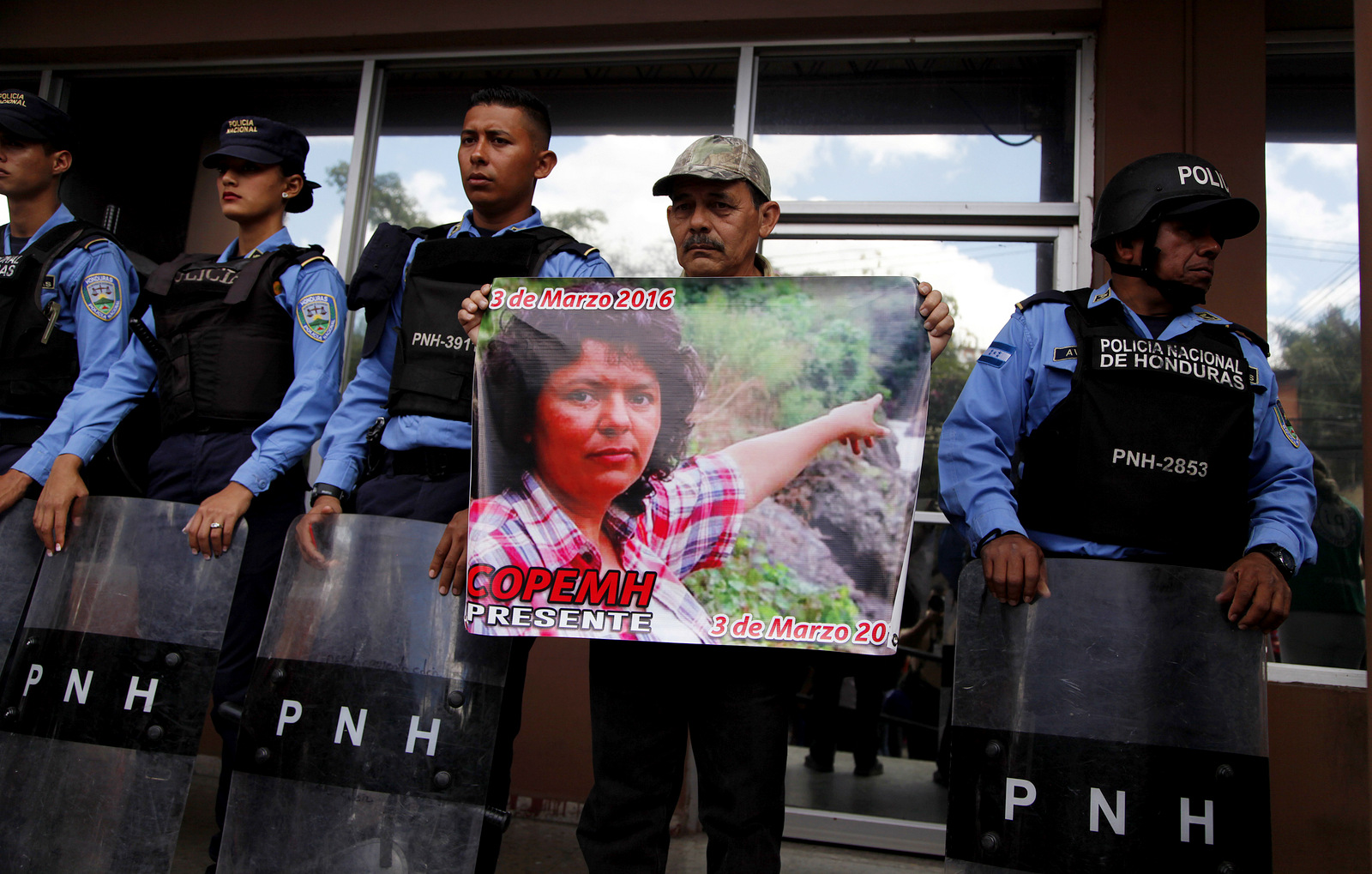
A man, flanked by police, holds a placard showing an image of slain environmental activist and Goldman Environmental Prize winner Berta Caceres, as part of a protest demanding justice for her murder, outside the Prosector’s Office in Tegucigalpa, Honduras, March 2, 2018. (AP/Fernando Antonio)
Spring and others suspect, however, that the timing of the arrest had a lot more to do with Honduras’ bruised international image than with securing justice in this case. Supporters of Caceres allege that other powerful businessmen, as well as high-level politicians, are responsible for Caceres’ assassination.
“The state of Honduras is not going to get away with not arresting more. David Castillo’s arrest is not sufficient to show that the state is committed to justice and battling impunity in relation to Berta Caceres’ assassination,” Spring said.
Spring also said, however, that she doubts that the government of President Juan Orlando Hernandez plans to make any more arrests.
Hernandez was re-elected as president late last year in a dubious election marred by fraud allegations. Luis Almagro, the secretary general of the Organization of American States — although a strong ally of Washington — called for the vote to be re-held, a request that was ignored by the Honduran government.
Even before they went to the polls, many Hondurans considered Hernandez’s candidacy illegitimate, as the Honduran constitution does not allow presidents to seek re-election. The Hernandez government is the third consecutive government led by a politician from the National Party, which came to power in another disputed election held only months after a military coup in 2009 expelled Mel Zelaya, a democratically elected president. That coup was consolidated thanks to the support of the Obama Administration. The Trump administration was, in like manner, quick to legitimize Hernandez’s reelection.
Completely one-sided “justice”
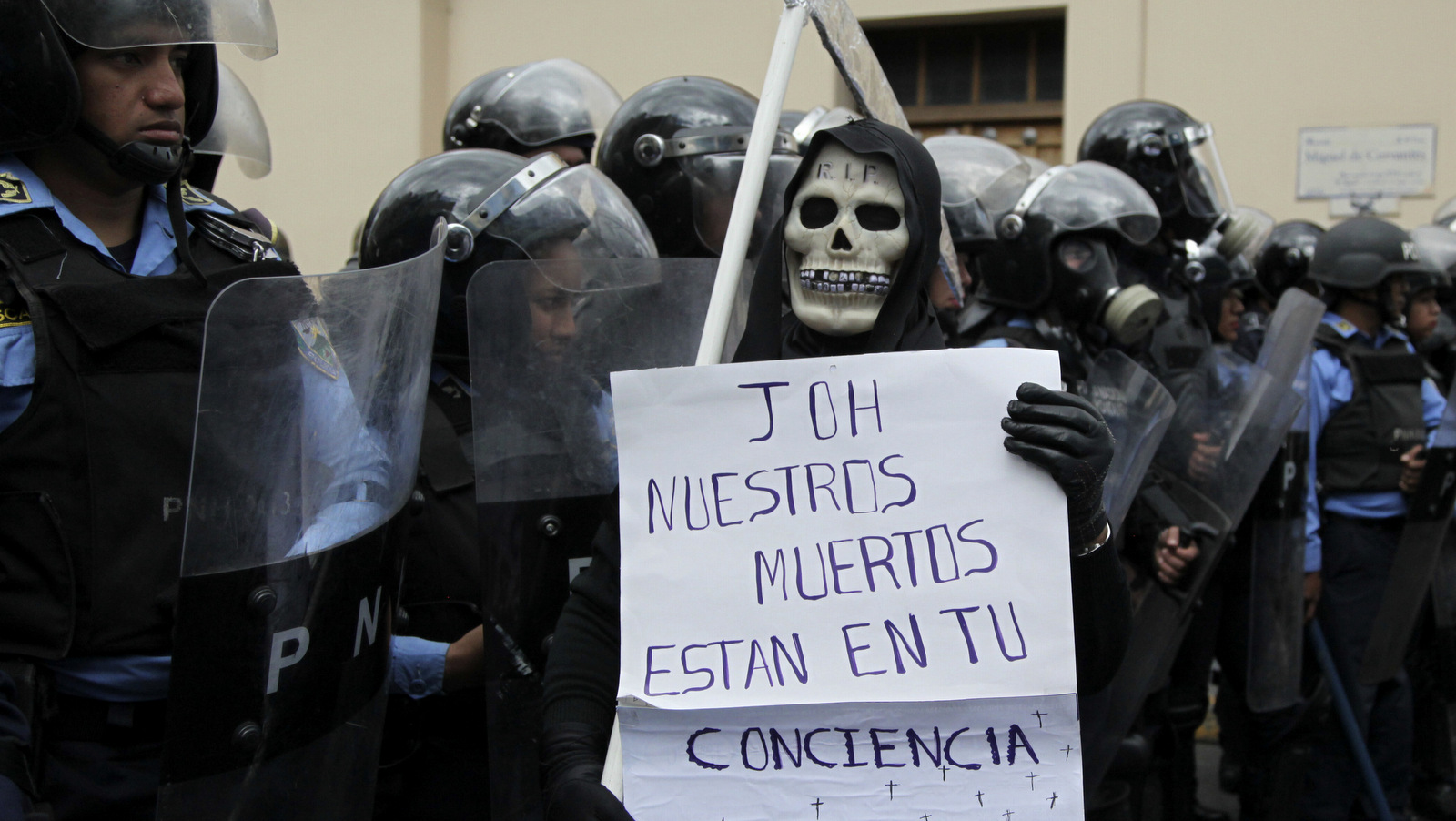
A protester wearing a grim reaper costume holds a sign with a message that reads in Spanish: “JOH our dead are on your conscience,” during a protest by demonstrators against Honduras’ President Juan Orlando Hernandez, in Tegucigalpa, Honduras, Jan. 25, 2018. (AP/Fernando Antonio)
Since the 2009 coup, successive Honduran governments have come under intense scrutiny for alleged human rights violations; meanwhile violent crime has skyrocketed, making the country one of the most dangerous in the world.
Spring believes that the arrest of Castillo in connection to Caceres’ murder came only as the result of intense domestic and international pressure and that it should not be seen as a sign that the Hernandez government is interested in improving its human rights record.
Thousands of Honduras took to the streets to demonstrate against Hernandez’s disputed reelection. During those protests, eyewitnesses reported the use of live ammunition by state security forces against demonstrations. Human rights defenders allege that at least 38 people were killed by the Honduran police and armed forces in the weeks following the vote.
“In all those cases, the state hasn’t even lifted a finger,” stated Spring.
Meanwhile, dozens of pro-democracy activists and demonstrators have been detained.
Spring added:
When you look at the lack of investigation into those 38-plus murders by state security forces and you look at the political will of the Honduran state to go after the 27 political prisoners who were jailed as a result of their involvement in the protests, it becomes very obvious that, in Honduras, the state lacks the will to really apply the rule of law.”
The case of jailed activist Edwin Espinal
Spring has been working to highlight the case of Edwin Espinal, her partner, who was detained on January 19, 2018, on the eve of nationwide protests against the Hernandez regime. Spring says the charges against him are baseless and merely constitute an effort to silence a critic of the regime.
Since his arrest, Espinal has been held in a maximum security military-run jail in sordid conditions.
According to human rights defenders working to secure his release, detainees inside La Tolva, the high-security prison where Espinal is held, are allowed only one-hour of sunlight every two weeks, and access to prisoners held inside the installation is notoriously strict.
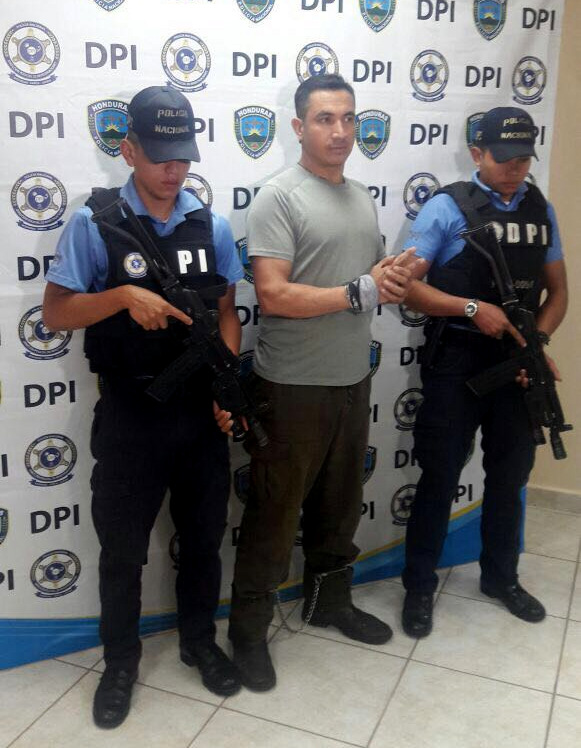
Edwin Robelo Espinal paraded in front of the media in shackles upon his arrest by Honduran police. Jan. 19, 2018.
Authorities recently limited prisoners’ access to water to only a few minutes a day, making the already harsh conditions worse. In light of these conditions, detainees staged an impromptu protest March 5, in which demonstrators noisily banged pots against building walls; the demonstration was met with rounds of tear gas being fired into an enclosed space.
Espinal went on a hunger strike in hopes of compelling authorities to grant him a visit with his doctor to attend to his worsening health.
Spring argues that the case of Edwin Espinal is an excellent example of how the Honduran state operates.
Espinal has been the regular target of harassment by the state, having been detained more than a dozen times. His treatment by Honduran authorities was such that the Inter-American Commission on Human Rights found that Espinal merited protective measures. He was abducted and tortured by Honduran police in 2010 and had his home raided in 2013.
Spring alleges that the cases involving political prisoners are rife with irregularities. As an example, she says that the judge who ordered the raid on Espinal’s home is the same who ordered his pre-trial detention in the maximum security jail, and is considered to be close to the ruling government.
Whereas the Honduran government was quick to detain Espinal, it took two years before it moved against David Castillo in the case of Berta Caceres, despite ample evidence.
“It’s very clear once you review these cases … it becomes very obvious that this about political will,” said Spring.
Who are U.S. and Canada trying to kid?
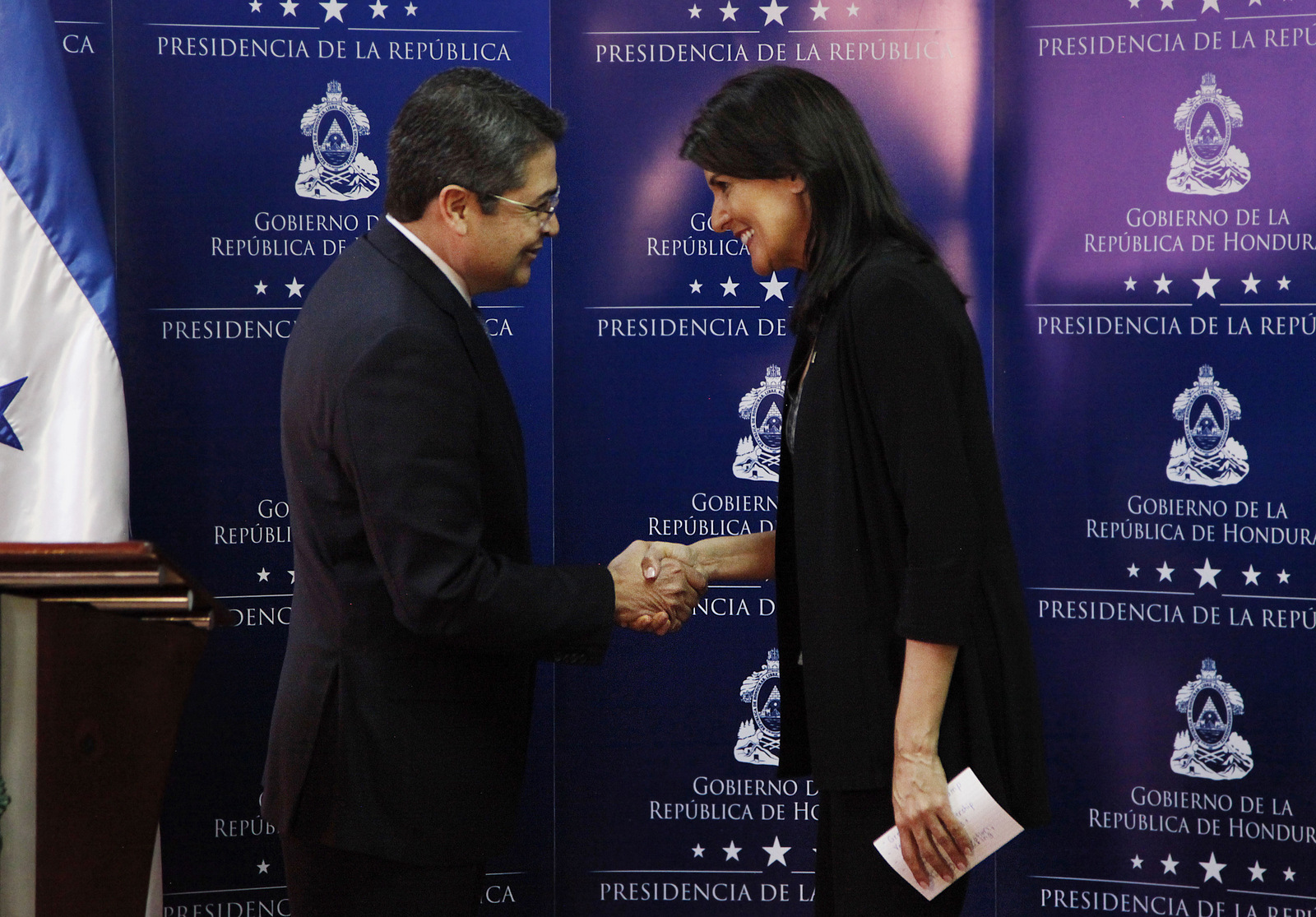
Honduras’ President Juan Orlando Hernandez, left, shakes hands with Nikki Haley, United States Ambassador to the United Nations, in Tegucigalpa, Honduras, Feb. 27, 2018. (AP/Fernando Antonio)
Both the U.S. and Canadian governments have justified sending millions of dollars in international aid into Honduras on the grounds that the country needs these funds to bring down the levels of violent crime and build a transparent justice system.
Spring contends that the U.S. and Canadian governments are not supporting human rights or the Honduran people at all, but instead are trying to advance their countries’ economic and geopolitical interests.
Both have long-running interests in Honduras. Many mining companies headquartered in Canada have operations in Honduras and the U.S. has long used the country as a staging point in its efforts to dominate the region. It thus follows that both were quick to legitimize the highly disputed presidential election.
“I think the only reason this government is in power is because of the U.S. government support,” argued Spring.
The Hernandez regime’s reliance on support from foreign governments serves, however, to further undermine its legitimacy inside the country and in the region.
The Honduran government finds itself mired in perpetual crisis and in an unstable situation.
It seeks greater legitimacy in the international community by moving to arrest a suspect in the murder of a prominent activist, but simultaneously it continues to detain a pro-democracy activist on spurious charges.
Getting better at getting away with murder and repression
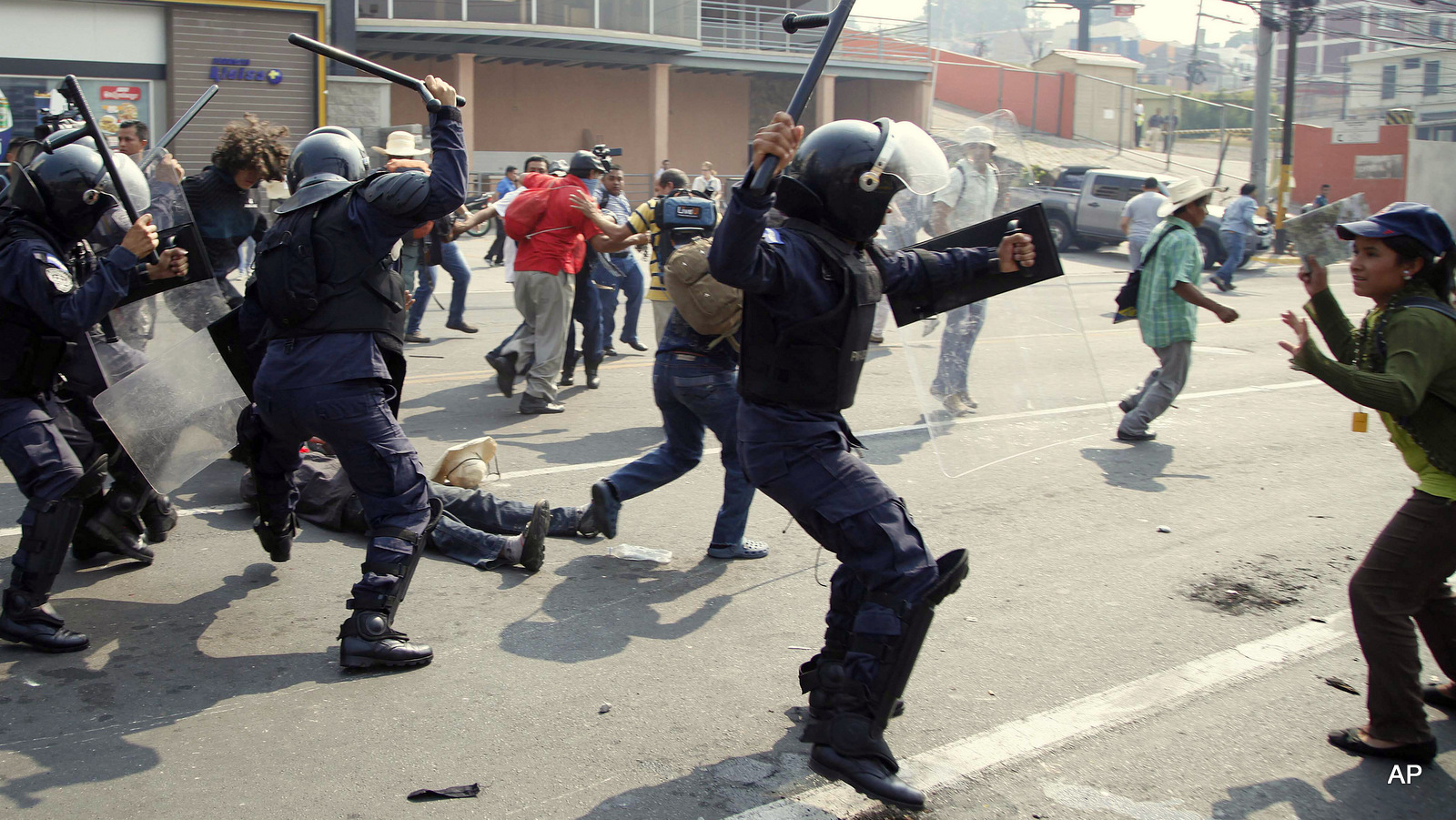
Police attack protesters outside the presidential office in Tegucigalpa, Honduras at a protest demanding justice for the murder of environmentalist and indigenous leader Berta Caceres, May 9, 2016. (AP Photo)
After a wave of intense repression, the Hernandez regime has scaled back its more overt violence but Spring argues the regime can only maintain itself through force.
“The repression is still going on but how they’re doing it now is much more difficult to document and denounce,” said Spring, alleging that death squads sanctioned by the government are operating with impunity.
“You can’t really talk about post-coup Honduras without understanding the role of fear,” she says.
The behavior of the Hernandez regime is in many ways akin to that of the violent dictatorships that existed throughout the region in the 20th century — regimes that maintained themselves in power through terror.
Spring says the Honduran government is working to scare the population into obedience. She maintains that the Hernandez regime will “pretend to care about human rights” in order to save face within the international community — and that, as a result, it is incumbent on people in the U.S., Canada, and European Union to condemn the Honduran government.
The arrest of David Castillo in connection to the murder of Berta Caceres was indeed due partially to the international pressure exerted on the government, a clear indication that solidarity can make an impact.
Top Photo | Roberto David Castillo is taken into custody by the police as he is walked to the Technical Investigation Agency in Tegucigalpa, Honduras, March 2, 2018. (AP/Fernando Antonio)
José Luis Granados Ceja is a writer and photojournalist based in Mexico City. He has previously written for outlets such as teleSUR and the Two Row Times and has also worked in radio as a host and producer. He specializes in contemporary political analysis and the role of media in influencing the public. He is particularly interested in covering the work of social movements and labor unions throughout Latin America.
The post Honduras: Arrest in Caceres Murder a Feeble Attempt at Image Rehab appeared first on MintPress News.
